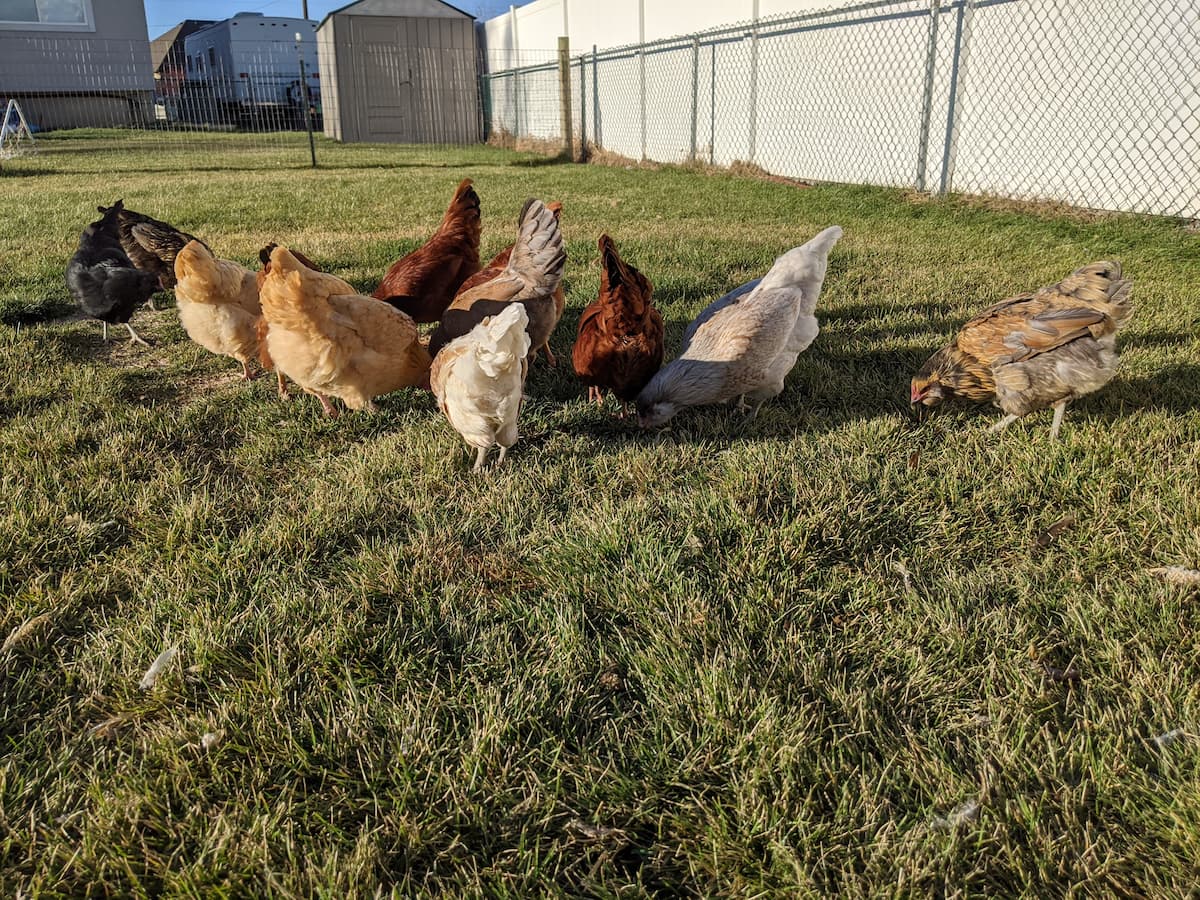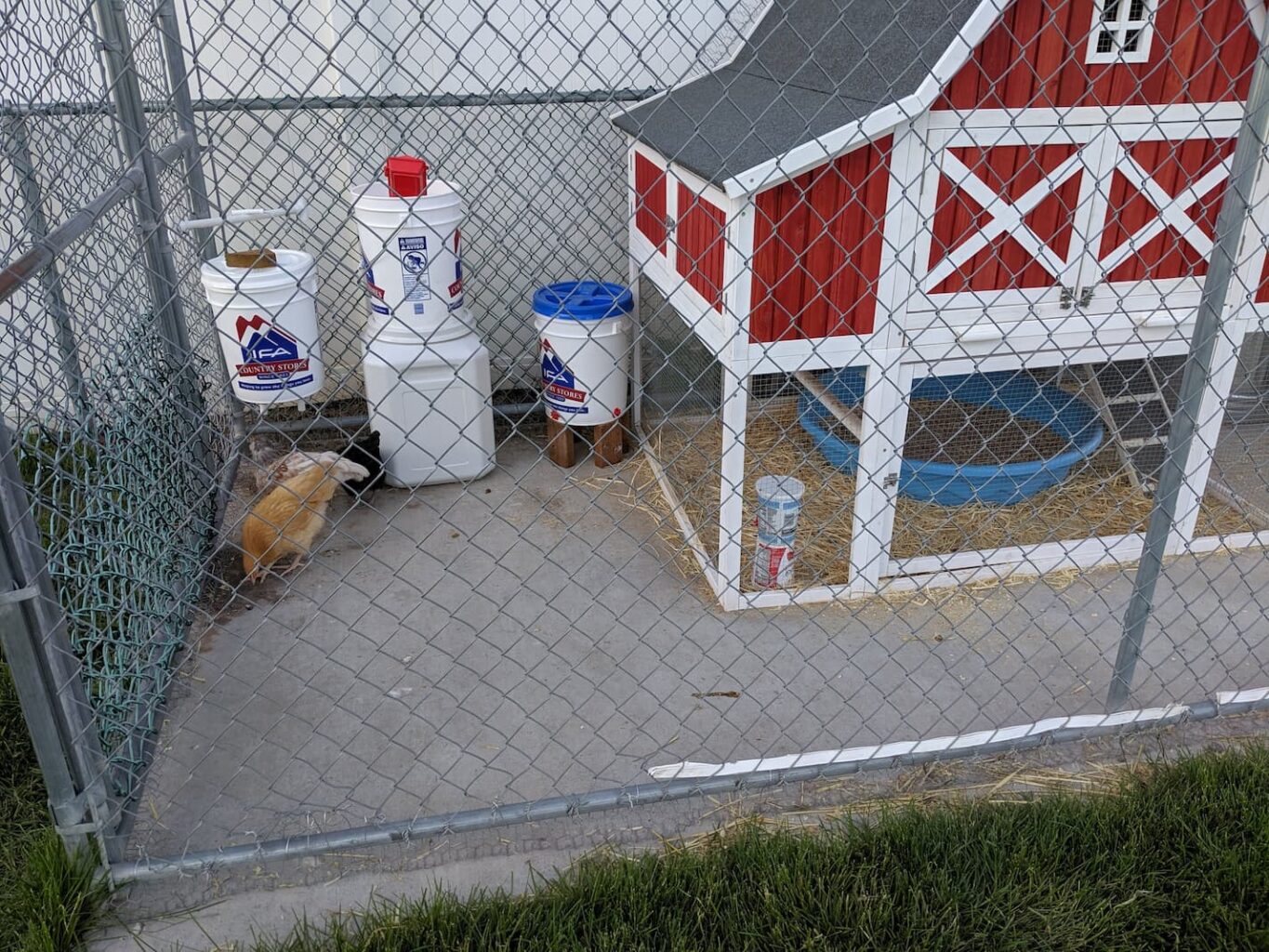While cleaning the coop one evening, I saw some mice trying to steal some fallen feed. I don’t want rodents in the coop, but then I wondered – do chickens catch and/or eat mice? And will they keep their coop rodent-free?
Chickens will catch and eat whatever looks appealing, they can catch, and they can swallow. This may include mice, frogs, lizards, bugs, rodents, and other small animals. Chickens that are free-range in a pasture will eat and catch their own food. Chickens in a coop may catch and eat easily accessible rodents in addition to their feed.
Ready to find out more about chickens, mice, and the food chain? Keep reading for more details!

Do Chickens Eat Mice?
Chickens are opportunistic omnivores – they’ll eat pretty much anything that they can fit in their beaks. So if a hungry chicken can catch a mouse, they’ll probably eat it.
Back before we switched to a rodent-free feeder, I once saw a couple of field mice eyeing spilled feed as a potential for an easy meal. However, then the mice spotted the chickens – and my chickens spotted the mice. The mice would have become a meal – if they hadn’t already been outside the chicken wire fencing.
Those mice scurried off – and my chickens have been on the mouse lookout ever since. They’ll frequently chase after who-knows-what while they’re in their little pasture. It could be mice – I’m often too late to see what it was that just got swallowed.
So a chicken eating a mouse is totally normal – it’s well within their capability to catch, eat, and digest. And it’s kind of nice to have some extra rodent control in the backyard, too.
Is it Bad for Chickens to Eat Mice?
Mice carry certain germs, contagious vectors, and other nasty things. So it’s totally normal to wonder if eating those germ-laden rodents would be bad for your chickens.
Everything I’ve found and experienced has shown me that it’s not bad for chickens to eat mice. It’s just part of life.
Chickens may get sick if they eat a particularly gross or diseased mouse. However, they’re less likely (based on my research) to get sick than would your cat who ate that same mouse.
The odds of recovering an eaten mouse (to test it for parasites or disease) is pretty almost nonexistent. If that mouse was eaten, it’s effectively gone. The only way you’ll know if your chicken ate a sick mouse is if it becomes sick – or if you see your chicken eating the mouse.
And even then, it’s not a guarantee that your chicken will get sick. If you’re at all worried, go ahead and quarantine the chicken in question while you wait to see what happens.
If your coop (or yard) has a lot of mice on a regular basis, you may want to proactively treat for common chicken parasites. And you’ll also want to rodent-proof your coop better. Keep reading for details on keeping mice away from your chickens.
Can Chickens Catch and Eat Mice in a Coop?
As we just discussed, a chicken can catch and eat a mouse. Will they do it in the coop or run? They’ll certainly try.
Here’s a YouTube video of chickens (in a coop) going after a whole handful of live mice.
Spoiler alert: if you’re queasy at the idea of watching chickens eat live mice, don’t play the video. The chickens win – and eat the mice, though it does take a bit.
Do Chickens Eat Mice while Free-Ranging?
While your chicken is in a designated pasture or part of your backyard, they’re going to eat whatever they can catch. This may include mice.
Our chickens have a set pasture area in our backyard – and sometimes we let them roam the whole yard. They eat whatever they find and like. Some days it’s pillbugs and earwigs. Other days it’s weeds and seeds. And sometimes it could be rodents.
Chickens will normally stick with the flock while ranging – but sometimes one will take off across the backyard. That’s when I wonder if they spotted a small mouse or a lizard. And then the rest of the chickens take off after it, too! One mouse doesn’t stand much of a chance against six hungry chickens.
Here is a YouTube video of somebody’s chickens taking off after mice while in their yard or pasture.
Spoiler alert: if you’re queasy at the idea of watching chickens chase and eat live mice, don’t play the video. The chickens win: Chickens – 1. Mouse – 0.
Do Mice Bother Chickens?
Generally, mice are the food and not the problem. However, some small rodents may try to steal eggs or even eat sleeping chickens (sleeping chickens are easier to catch than awake ones!).
Generally, it’s the larger rodents (like rats) that try to eat chickens. Smaller rodents, like mice, generally eat chicken feed and/or eggs as it’s easier to get – and has a lower chance of getting the mouse eaten should they wake a chicken.
So if mice are just trying to steal food (and/or eggs) and are leaving your chickens alone, then they’re probably not bothering your chickens too much. They’re just bothering you!
On the other hand, if the mice (or larger rodents) are trying to assert their dominance on the food chain, then that’s bothering the chickens – and you. That’s when you’ll need to make more rodent-proofing efforts on your chicken run, coop, and pasture.
How Do You Keep Mice Away from Chickens?
The best way to keep mice away from your chickens is to rodent-proof your chicken areas. Specifically, rodent-proof (as much as possible) the run, the coop, the pasture, and especially your feeding area.
Generally, the mice are after the chicken feed – not the chickens. So if you can control how much food your chickens are spilling and wasting, you should dramatically reduce the appeal to rodents.
We rodent-proofed our feed area by making a DIY chicken feeder like this one:
We also rodent and pest-proofed the feeding area by keeping the chickens’ water in another 5-gallon bucket. The chickens can get water via any of several chicken nipples – but then there’s no standing water to attract other animals or bugs.
Personally, I like the horizontal watering nipples better than the vertical ones. They seem to work better and leak less. Also, get the ones without the cups – the cups tend to have water left in it which attracts bugs (especially mosquitos).
You’ll also want to keep any chicken scratch in a sealed container. And if you can, go for a metal container instead of plastic or a bag. Rodents can nibble through both plastic and bags of all kinds. I’ve yet to see any rodents nibble through our aluminum garbage cans, though!
Then, when you do give your chickens some scratch (or mealworms) as a treat, just give them a small amount. They’ll probably be mad that they don’t have ready-access to treats on-demand, but that’s not good for them anyway. Keep treats small – and by doing so, you’ll help keep the rodents (and mice) away from your chickens and your backyard.
Here is our setup, just in case you were wondering what it looks like.

The bucket with the white lid holds food. The bucket with the blue lid holds water. And the aluminum cans hold their bedding and treats.
That way, our chickens can be happy and safe from rodents – while getting to eat one if they want to.
Related Questions
Do chickens eat rats? Chickens have been known to eat rodents of all kinds, rats included if rodents are easily accessible. To our knowledge, our chickens haven’t eaten any rats simply because we focus on keeping rodents and pests out of our yard.
Why do chickens eat baby mice? Baby mice are smaller and easier to catch than adult mice. Predators of all varieties, chickens included, prefer an easier meal.
Do chickens eat mice whole? A chicken may swallow a mouse whole or may use its beak to eat it in smaller chunks. Eating it whole (vs eating it in pieces) may depend on the size of the rodent, how many chickens are trying to eat the rodent, and how hungry the chickens are.
